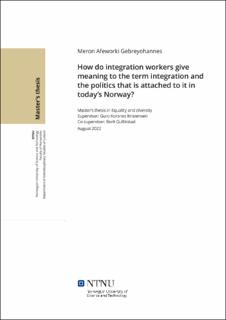| dc.contributor.advisor | Kristensen, Guro Korsnes | |
| dc.contributor.advisor | Gullikstad, Berit | |
| dc.contributor.author | Gebreyohannes, Meron Afeworki | |
| dc.date.accessioned | 2022-09-22T17:20:20Z | |
| dc.date.available | 2022-09-22T17:20:20Z | |
| dc.date.issued | 2022 | |
| dc.identifier | no.ntnu:inspera:107637698:17276887 | |
| dc.identifier.uri | https://hdl.handle.net/11250/3020776 | |
| dc.description.abstract | Denne masteroppgaven er en kvalitativ studie som undersøker hvordan integreringsarbeidere gir mening til begrepet integrering og den politikken som er knyttet til begrepet i dagens Norge. Ved å bruke tematisk analyse til å kategorisere temaene i materialet, tar jeg sikte på å vise hvordan ulike betydninger og forståelse er knyttet til begrepet integrering basert på konteksten. Analysen er basert på syv intervjuer utført med syv integreringsarbeidere som jobber i samme kommune. Dataen ble samlet inn i løpet av noen få måneder i 2017. Basert på analytiske begreper, integrering og assimilering, sosial identitetsteori, likhet som ideal og minorisering og majorisering, analyserer jeg hvordan integrering forstås av integreringsarbeidere, samt effektene som kommer fra disse forståelsene. Personlige forståelser av integrering, forståelser av integrering produsert gjennom mine informanters arbeid og forståelser av integrering produsert i forhold til kjønn diskuteres for å belyse det overordnede spørsmålet.
Integrering, som forskning viser, er et tvetydig begrep som brukes til å bety forskjellige ting. Jeg ser på dette begrepet fra integreringsarbeidernes perspektiv som har direkte kontakt med deltakere i introduksjonsprogrammet. Å utforske deres forståelser er avgjørende på grunn av informantenes posisjon som bakkebyråkrater med diskresjon og autonomi.
Selv om egenskapene som tilskrives integrering i mine informanters innledende definisjoner lener seg mot sosial integrasjon, viser analysen at begrepet skifter mening avhengig av temaet som diskuteres. Forståelsen av integrering som produseres av mine informanters arbeid tyder på at integrering er likestilt med sysselsetting og økonomisk uavhengighet. På den annen side, når kjønn er tema, er integrering likestilt med å etterligne den norske formen for kjønnslikestilling.
De ulike forståelsene av integrering gitt av integreringsarbeidere indikerer at begrepet ikke bare er tvetydig, men også defineres på radikalt forskjellige måter av de samme informantene avhengig av emnet.
| |
| dc.description.abstract | This master’s thesis is a qualitative study that examines how integration workers give meaning to the term integration and the politics that is attached to it in today’s Norway. By using thematic analysis to categorize the themes in the material, I aim to show how different meanings and understanding are attached to the term integration based on the context. The analysis is based on seven interviews conducted with seven integration workers working in the same municipality. The data was gathered within a span of a few months in 2017. Based on the analytical terms, integration and assimilation, social identity theory, sameness as an ideal and minoritizing and majoritizing, I analyze how integration is understood by integration workers, as well as the effects that emerge from these understandings. Personal understandings of integration, understandings of integration produced through my informants’ work and understandings of integration produced in relation to gender are discussed to shed light on the overarching question.
Integration, as research shows, is an ambiguous term that is used to mean different things. I look at this term from the perspective of integration workers who have direct contact with participants of the introduction program. Exploring their understandings is essential because of my informants’ position as street-level bureaucrats with discretion and autonomy.
Even though the characteristics attributed to integration in my informants’ initial definitions lean towards social integration, the analysis shows that the term shifts meaning depending on the topic being discussed. The understanding of integration that is produced by my informants’ work indicates that integration is equated with employment and economic independence. On the other hand, when gender is the topic, integration is equated with imitating the Norwegian form of gender equality.
The different understandings of integration given by integration workers indicate that the term is not only ambiguous but is also defined in radically different ways by the same informants depending on the topic at hand. | |
| dc.language | eng | |
| dc.publisher | NTNU | |
| dc.title | How do integration workers give meaning to the term integration and the politics that is attached to it in today’s Norway? | |
| dc.type | Master thesis | |
